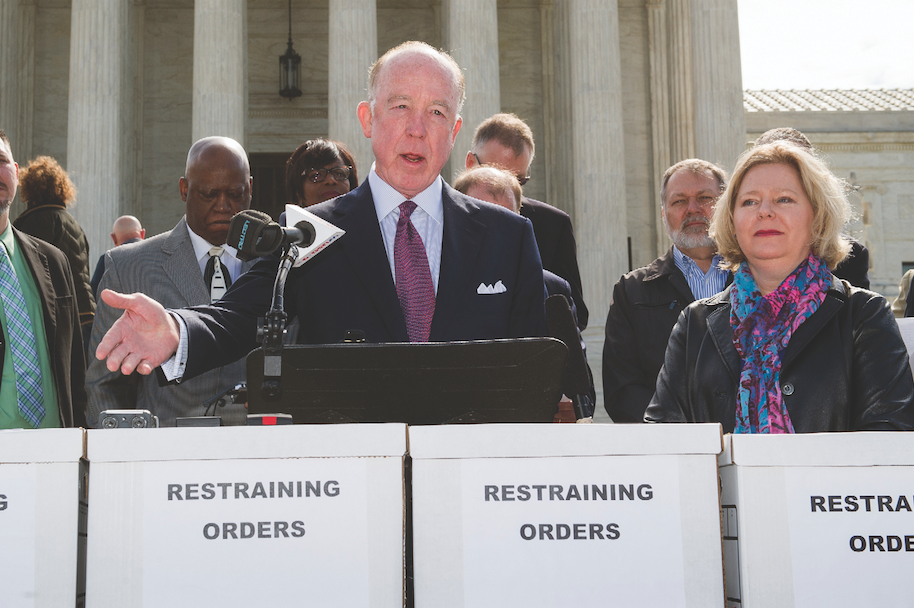
Houston Gets Its First Official Anti-LGBT Hate Group
Hotze’s right-wing group makes the Southern Poverty Law Center’s list.
By John Wright
The designation of Dr. Steve Hotze’s Conservative Republicans of Texas (CRT) as an anti-LGBT hate group could be a game-changer in the battle for LGBT rights in Houston and across Texas.
The Alabama-based Southern Poverty Law Center (SPLC), one of the nation’s most respected civil rights groups, added CRT to its list of 48 anti-LGBT hate groups nationwide on February 17.
Hotze, a wealthy Republican donor and longtime anti-LGBT activist, was a major financial supporter of the successful campaign to repeal the Houston Equal Rights Ordinance (HERO).
SPLC reported that its designation of CRT as a hate group was based in part on the anti-HERO campaign’s heavy reliance on advertisements suggesting the ordinance would allow men to enter women’s restrooms and prey on children, even though no such incident has been reported in any of the more than 200 U.S. cities with similar laws.
“What we look at in the anti-LGBT groups is primarily the use of lies, of falsehoods, that have the effect of demonizing gay people,” said SPLC senior fellow Mark Potok, who authors the group’s annual “Intelligence Report” on extremist organizations. “So it’s not merely that they opposed the HERO ordinance; it’s the way in which they did it—the description of gay people as pedophiles, and so on.”
Dan Quinn, a spokesman for the Texas Freedom Network who’s written about Hotze repeatedly over the years, said SPLC’s hate-group designation adds legitimacy to LGBT advocates’ contention that the anti-HERO campaign was rooted in deception and fear-mongering. “The fact that this organization has identified Hotze and his organization as a hate group is pretty substantial,” Quinn said. “It’s also important to note that Hotze has all these ties with other major politicians in the state. That says a lot about the state of politics in Texas right now.”
Quinn said CRT’s hate-group status could be beneficial to LGBT advocates if and when HERO appears on the ballot again—but only if people know about it. “That means supporters of equality and antidiscrimination measures have to be willing to point that out, in a very public way,” he said.
In recent weeks, Hotze has appeared at campaign events across the state alongside former Harris County GOP chair Jared Woodfill, who served as a spokesman for the anti-HERO campaign and is now running for chair of the Republican Party of Texas. “This is kind of a network they’ve created here, of people who think very much along the same lines, which should be disturbing,” Quinn said. “If you’re a Republican in this state, I would be a little appalled that these folks have that kind of influence over the primaries and over the platform.”
Hotze, who recently said HERO was linked to a “Satanic movement,” didn’t immediately respond to a message seeking comment. According to CRT’s website, the organization is dedicated to advancing “Constitutional liberties based upon Biblical principles.”
At an anti-LGBT rally last summer, Hotze wielded a sword on stage, compared LGBT people to Nazis, and pledged to drive “homofascists” from Houston to San Francisco. After the U.S. Supreme Court’s ruling in favor of nationwide marriage equality, Hotze said justices that sided with the majority opinion “hate God” and “want to let sodomites queer our country,” and that the decision would lead to kindergarten teachers encouraging their students to try anal sex.
CRT becomes SPLC’s fourth anti-LGBT hate group in Texas and its first in Houston, joining Tom Brown Ministries of El Paso, Probe Ministries of Plano, and Stedfast Baptist Church of Fort Worth. Three of the four were added to SPLC’s list in the last two years, and the number of anti-LGBT hate groups nationwide has nearly doubled since 2011, when there were only 27. “These groups have had a series of losses that have them in a white-hot fury,” SPLC’s Potok said. “People who resent LGBT people and the gains they’ve made are organizing, but it’s very much a rear-guard action. These groups are really vile and nasty, but they’re losing the battle, and ultimately they’re going to lose the war.”
In the face of mounting losses in the U.S., Potok said more anti-LGBT groups are turning their attention overseas, leading efforts to make homosexuality illegal in some countries. Anti-LGBT hate groups are also increasingly targeting transgender people, which contributed to an increase in anti-trans violence last year, including at least 23 murders. “Transgender people, and in particular transgender women of color, are the single most victimized group of people in the United States,” Potok said. “These are people whom it is apparently still all right to hate.”
The surge in anti-LGBT organizations contributed to a 14 percent increase in the total number of hate groups in 2015, from 784 in 2014 to 892. It was the first overall increase in five years, and SPLC said that thanks to politicians like Republican presidential frontrunner Donald Trump—who graces the cover of this year’s “Intelligence Report”—the nation is more polarized and angry than it’s been since the political turmoil of 1968.
In spite of the dramatic increase in anti-LGBT activity, the overall spike in hate groups was fueled mostly by new Ku Klux Klan chapters and black separatist groups, as well as anti-immigrant and anti-Muslim organizations, SPLC said.
“While the number of extremist groups grew in 2015 after several years of declines, the real story was the deadly violence committed by extremists in city after city,” Potok said. “After seeing the bloodshed that defined 2015, our politicians should have worked to defuse this anger and bring us together as a nation. Unfortunately, the carnage did little to dissuade some political figures from spouting incendiary rhetoric about minorities. In fact, they frequently exploited the anger and polarization across the country for political gain.”










